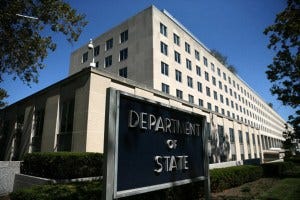Foggy Bottoming Out
The State Department has lost its way. Time to clean house and refocus on what really matters: the national interest.
America has been the preeminent world power since at least the end of the Second World War. During that time, our diplomatic corps has carried the weight of our national interests quite well, helping to defeat communism and win the Cold War, as well as cement America’s superpower status in the post-1991 geopolitical environment. That strong pursuit of our national interest has been part and parcel of State’s mission since the earliest days of our Republic. Foreign policy is one of the few genuinely federal responsibilities and has historically been the primary task of the national government.
For America’s first decades, diplomatic posts were filled by some of the nation’s leading thinkers and political figures. The Secretary of State job, far more so than the Vice Presidency, was the stepping stone to the highest office in the land. Illustrious men like John Jay, Thomas Jefferson, John Marshall, James Madison, James Monroe, John Quincy Adams, Henry Clay, Martin Van Buren, and Daniel Webster all held the office in the first half century of American history. During the Cold War, leading geopolitical thinkers like George Marshall, Dean Acheson, John Foster Dulles, Henry Kissinger, George Shultz, and James Baker filled the seat and manfully advocated for American interests and toward the ultimate defeat of our communist enemy. Since the end of the Cold War, however, the appointments to serve as America’s top diplomat have been quite hit or miss.
But this is merely a symptom of a far deeper problem: the entire State Department and larger diplomatic apparatus have degraded into a shade of their former selves, pushing vainglorious progressive ideology over the national interest. The national diplomatic structure no longer centers concrete American interests, instead prioritizing diplomacy as an end of itself and exploding with unnecessary bloat and bureaucracy. In this, our national diplomats are more interested in being seen as in touch with the so-called international community, avoiding conflict at all costs, and unnecessarily criticizing our allies than they are assiduously advocating for American interests, whatever that entails. The permanent bureaucracy has put its own self-interest – including its political preferences – ahead of the national interest as defined by the presidential administration they serve. All of this has rendered American diplomacy an inert force at best and a truly counterproductive one at worst.
After the existential threat posed by the Soviet Union was defeated, American geopolitical strategy was left adrift without a solid mooring. The broad national interest was suddenly up for debate for the first time in nearly 70 years. Those were halcyon days with no true international rival and a flowering of the American world system with minimal strife or major disagreement on key issues. This period allowed career diplomats, mostly left-leaning, to become both complacent with America’s global position and simultaneously utopian about the new progressive world order they could craft. But this was not the new normal. History was not, as one important geopolitical thinker put it, over. This Era of Good Feelings was a historical blip – an anomalous period that would see a crash back to reality soon enough.
The start of that crash came on a sunny Tuesday morning in September 2001. Still, even during the War on Terror that followed the heinous Al Qaeda attacks, American diplomats and geostrategists believed that in order to defeat our foes, we must remake their societies in our image. This continued the utopian strain of the 1990s and reinforced the culture of progressivism in our diplomatic corps. The conspicuous failure of those ambitious and misguided attempts at crafting American-style civil society and political culture from scratch led to much of the American public seeing the wars themselves as failures, despite the immense military and security successes in both Afghanistan and Iraq.
Under the last three presidential administrations – Obama, Trump, and Biden – American diplomacy has taken those trends to the asymptotic limit, careening off a cliff in the process. During that period, one characterized by the woke takeover of institutions, our diplomatic corps has leaned hard into pushing progressivism abroad, regardless of whether that message fits with the administration they are meant to be serving. From the ridiculously inordinate focus on climate change and LGBT/gender ideology to the deeply held belief that negotiation in and of itself is a positive good, the state of American diplomacy is a shambles. We have seen greater belligerence from our enemies, an alienation of our allies, repeated negotiating failures, and a massive reduction in the broad belief in American deterrent power. Just this week, we’ve seen the apotheosis of this absurdity.
First, Secretary of State Blinken – who is seemingly more interested in playing decades-old rock and roll covers on his guitar than he is on advocating for American interests – discussed what he called a “concerning increase in hate speech in India.” Besides the fact that the United States doesn’t itself have a legal prohibition on so-called “hate speech,” it is patently irrational for America’s top diplomat to chastise a critical country like India for something so minor. India is perhaps the most important nation in the 21st century Great Game being fought between America and our allies on one side and the axis of China, Russia, and Iran, along with their satraps, on the other. It is the most populous nation on the planet, has a growing economy that is primed for future expansion, is rising in geopolitical self-confidence, and is a relatively stable democratic polity. It also happens to sit in one of the most important geostrategic areas for a century that will be dominated by the Indo-Pacific. Alienating this crucial potential ally over something as silly as “hate speech” is utter lunacy. And it shows exactly where the priorities lie over at Foggy Bottom: on progressivism above our national interests.
The second example this week comes from a press conference given by Matthew Miller, the spokesman for the State Department. In that press availability, Miller was asked about the threat posed by China’s rapidly expanding influence in Latin America – building dual-use infrastructure, engaging in military cooperation, and supporting anti-American regimes in our own backyard. In response, he spouted this word salad:
“So we have long understood, and have spoken to this publicly, the fact that other countries are going to have relationships with China. They’re going to have diplomatic relationships with China. We’re going to have – they’re going to have economic relationships with China. That is no different than the United States. We have diplomatic and economic relationships with China. What we have always made clear to countries around the world, and this very much includes countries in our own hemisphere, is that they need to go into those relationships eyes wide open. And they need to understand that if they enter into agreements with China, they ought to ensure that those agreements have transparency, that they are in the best interests of their governments, and most importantly, in – on – in the people of their countries, and to make sure that they’ve – are – fully meet international standards.”
This may seem like reasonably normal diplo-speak, but in reality, it is pure capitulationism. We have taken upon ourselves a special role in the Western Hemisphere since the promulgation of the Monroe Doctrine in 1823. This is a region meant to be free from outside interference, even if it means we need to take a stronger hand in shepherding our neighbors towards such a policy. We have historically had no qualms whatsoever about intervening in Latin America to achieve policy outcomes in line with that important goal. But this administration’s diplomats have chosen the path of weakness instead. We shouldn’t meekly accept the Chinese takeover of Latin America, but our diplomatic corps is too scared of looking like big meanies to actually buck up and do what is required. The talk of “transparency” and fully meeting “international standards” is just the cherry on top of this excrement sundae. This isn’t even weak tea; it’s plain old hot water.
This disaster needs fixing, as soon as possible. And that fix must be total. Foggy Bottom must be revamped from the ground up. Political appointees are the start, but career bureaucrats are just as bad. The permanent diplomatic corps should be gutted and remade. This isn’t a minor renovation project. It’s the blowing out of walls and the total reorganization of the institution. New people with new ideas need to be recruited, largely from the private sector. Geopolitical knowledge isn’t purely the preserve of overeducated progressives from top universities; in fact, real-life knowledge often trumps the theoretical.
The diplomatic corps is also far too bloated. We don’t need special envoys for every progressive topic under the sun, from climate change to LGBT acceptance. Hell, we don’t even need special envoys for religious freedom or democracy promotion. All these special interests do is take away from the primary focus of diplomacy: achieving the national interest and safeguarding American security. I am all for a policy that seeks to make the rest of the world more like us; it would be a much better, safer, freer place at the end of the day. That approach may work in a relatively peaceful, calm world. But that isn’t the one we live in. Ours is one of chaos, strife, and conflict. It is replete with bad actors seeking to do us harm and upend the global order that serves as the foundation for our prosperity, security, and way of life. We cannot afford to prioritize the wrong things in such an environment – it would be a fatal mistake.
In terms of negotiation and internationalism, we must alter our current approach. We should only foreground negotiation if it serves our interests directly. For instance, we should not be negotiating with Iran over its nuclear program. We should not be negotiating against our ally Israel in order to save our enemy Hamas. We should not be negotiating with our enemies in situations where negotiation either favors them or allows them the time to achieve their ends via other means. We can no longer assume good faith on the part of our interlocutors. We need to approach negotiation in a more businesslike manner, not as disinterested bureaucrats who find it a fun reprise of their Model UN days. On that note, we not default to internationalism and should go into global institutions with a skeptical, wary mien, only promoting them if they serve our interests. The United Nations, the WHO, and the various global climate groups are entirely captured by our adversaries. They act directly contrary to American interests and we should take leave of them, bringing our dollars with us. The regional alliances, like NATO, that do help advance our interests should stick around. But we still should be concerned about mission creep, bureaucratic stasis, and geopolitical inertia driving towards less-ideal outcomes.
No more progressive wishcasting in our diplomatic affairs. No more caring about Indian “hate speech” over Indian hard power. No more letting enemy actors run roughshod over us simply because we don’t want to look bad to the ‘international community’ – a bunch of rich elite snobs in European capitals and Midtown Manhattan. No more negotiation for negotiation’s sake. No more surrendering of American sovereignty to anti-American global institutions. No more hanging allies out to dry when they need us most. No more putting parochial political self-interest over the national interest. Enough is enough.
This may sound like heresy to the career diplomats at State, but sometimes heretics end up being right.



